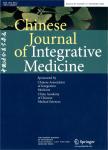Emotionless Holism:Factor and Rasch Analysis of the Chinese Integrative Medicine Attitude Questionnaire
Emotionless Holism:Factor and Rasch Analysis of the Chinese Integrative Medicine Attitude Questionnaire作者机构:School of Public and Primary CareChinese University of Hong Kong
出 版 物:《Chinese Journal of Integrative Medicine》 (中国结合医学杂志(英文版))
年 卷 期:2012年第18卷第6期
页 面:457-465页
核心收录:
学科分类:090603[农学-临床兽医学] 07[理学] 09[农学] 0906[农学-兽医学] 0701[理学-数学] 070101[理学-基础数学]
基 金:Supported by the Health Services Research Fund Health and Food Bureau Hong Kong China(No.05060521)
主 题:psychometrics questionnaires Chinese medicine holistic health attitude of health personnel
摘 要:T Objective: To examine the Eastem-Westem difference in the interpretation of Integrative Medicine Attitude Questionnaire (IMAQ) by assessing the psychometric properties of a revised Chinese medicine (CM)- specific version of IMAQ (CM-IMAQ). Methods: Factor and Rasch analysis were performed with data collected from a mail survey of 165 Hong Kong Western medical doctors (WMD) randomly sampled from the official registry. The structural validity, unidimensionality, item fit, and differential item functioning (DIF) of the Hong Kong CM-IMAQ were evaluated. Results: Confirmatory factor analysis (CFA) demonstrated that the original IMAQ factor structure was not concordant with our data on Chinese WMD, and subsequent explanatory factor analysis (EFA) validated a new three-factor model for CM-IMAQ: (1) attitude towards tonification , (2) attitude towards the effectiveness of CM, and (3) attitude towards CM knowledge. The original IMAQ factor on holism and doctor-patient relationship disappeared. Rasch analysis confirmed the unidimensionality of tonification and the effectiveness domains, but further refinement of the knowledge domain is needed. Coaclusions: Cultural adaptation of the IMAQ has demonstrated differences between Eastern and Westem doctors trained in allopathic medicine in their interpretations of hoiism in healthcare. For Chinese WMD, the emphasis of holistic care is placed on tonifying' the body rather than on nurturing the mind and spidt. Confucian and Taoist conceptualizations of mental health as well as the persistent stigma towards mental illness within modern Chinese culture may explain why Chinese WMD do not regard mental health promotion as part of routine healthcare.



